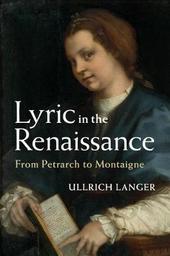
|
Lyric in the Renaissance: From Petrarch to Montaigne
Paperback / softback
Main Details
| Title |
Lyric in the Renaissance: From Petrarch to Montaigne
|
| Authors and Contributors |
By (author) Ullrich Langer
|
| Physical Properties |
| Format:Paperback / softback | | Pages:226 | | Dimensions(mm): Height 230,Width 150 |
|
| Category/Genre | Literary studies - c 1500 to c 1800
Literary studies - poetry and poets |
|---|
| ISBN/Barcode |
9781107526990
|
| Classifications | Dewey:841.309 |
|---|
| Audience | | Professional & Vocational | |
|---|
|
Publishing Details |
| Publisher |
Cambridge University Press
|
| Imprint |
Cambridge University Press
|
| Publication Date |
19 October 2017 |
| Publication Country |
United Kingdom
|
Description
Moving from a definition of the lyric to the innovations introduced by Petrarch's poetic language, this study goes on to propose a new reading of several French poets (Charles d'Orleans, Ronsard, and Du Bellay), and a re-evaluation of Montaigne's understanding of the most striking poetry and its relation to his own prose. Instead of relying on conventional notions of Renaissance subjectivity, it locates recurring features of this poetic language that express a turn to the singular and that herald lyric poetry's modern emphasis on the utterly particular. By combining close textual analysis with more modern ethical concerns this study establishes clear distinctions between what poets do and what rhetoric and poetics say they do. It shows how the tradition of rhetorical commentary is insufficient in accounting for this startling effectiveness of lyric poetry, manifest in Petrarch's Rime Sparse and the collections of the best poets writing after him.
Author Biography
Ullrich Langer is Alfred Glauser Professor of French and Director of the Center for Early Modern Studies at the University of Wisconsin, Madison. He has published widely in the fields of French and Italian literature, and is the editor of The Cambridge Companion to Montaigne (Cambridge, 2005) and the author of Penser les formes du plaisir litteraire a la Renaissance (2009).
Reviews'In this genuinely original and carefully meditated study, Langer is not interested in the lyric 'self' as usually construed or constructed, but rather in a series of textual phenomena that foreground the singularity and existence of individual objects and subjects. The power and the beauty of this book lie in its ability to give an alternate account of Renaissance lyric which avoids the Scylla of humanistic essentialism, on one hand, and the Charybidis of social-historical determinism, on the other, while offering a model of reading and understanding that is at once recognizable and 'estranging' in the very best sense.' Albert Russell Ascoli, Terrill Distinguished Professor, University of California, Berkeley 'Bringing his customary erudition and insight to bear on some of the most familiar works of the Renaissance, Ullrich Langer discovers surprisingly original effects of 'an 'existential singularity'', as distinct from classical ethos and pathos as it is from modern subjectivity. These sensitive, sympathetic readings offer an impressive reappraisal not only of first-person writing in the Renaissance but of the way Renaissance poetry was designed to act on its readers.' Edwin M. Duval, Yale University, Connecticut '... offers a reading of early modern lyric that cuts obliquely across all of our usual categories for understanding the period, welcomingly unsettling both historicist and formalist perspectives alike.' Vanessa Glauser, Renaissance and Reformation '... a rhetorically meticulous reading, historically informed without being historicizing, showing how a few carefully deployed rhetorical devices produce the startling affective jolts, the impression of wrenching selfhood and inexplicable, inexpiable yearnings that this poetry can still call forth.' William N. West, Modern Philology
|